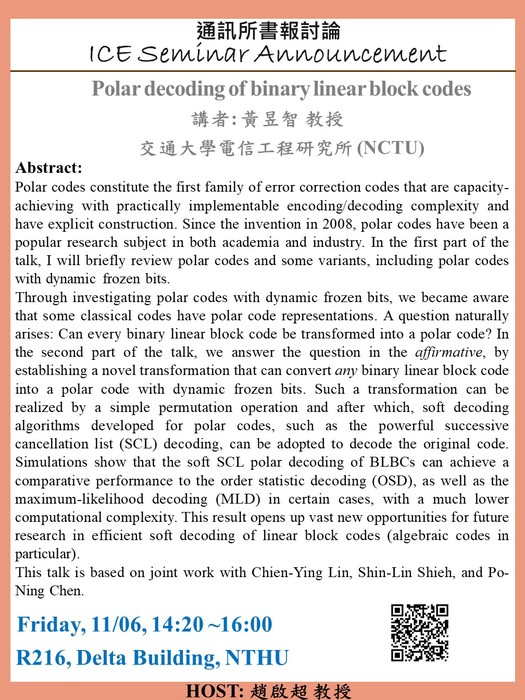


Date&Time :
2020 / 11 / 06 (Fri) 14:20 ~ 16:20
Location :
Delta Building R216
Speaker :
黃昱智 教授 (交通大學電信工程研究所)
Topic :
Polar decoding of binary linear block codes
Abstract :
Polar codes constitute the first family of error correction codes that are capacity-achieving with practically implementable encoding/decoding complexity and have explicit construction. Since the invention in 2008, polar codes have been a popular research subject in both academia and industry. In the first part of the talk, I will briefly review polar codes and some variants, including polar codes with dynamic frozen bits. Through investigating polar codes with dynamic frozen bits, we became aware that some classical codes have polar code representations. A question naturally arises: Can every binary linear block code be transformed into a polar code? In the second part of the talk, we answer the question in the affirmative, by establishing a novel transformation that can convert any binary linear block code into a polar code with dynamic frozen bits. Such a transformation can be realized by a simple permutation operation and after which, soft decoding algorithms developed for polar codes, such as the powerful successive cancellation list (SCL) decoding, can be adopted to decode the original code. Simulations show that the soft SCL polar decoding of BLBCs can achieve a comparative performance to the order statistic decoding (OSD), as well as the maximum-likelihood decoding (MLD) in certain cases, with a much lower computational complexity. This result opens up vast new opportunities for future research in efficient soft decoding of linear block codes (algebraic codes in particular). This talk is based on joint work with Chien-Ying Lin, Shin-Lin Shieh, and Po-Ning Chen.
Bio :
Yu-Chih (Jerry) Huang received the Ph.D. degree in electrical and computer engineering from Texas A&M University in 2013, where he was a Postdoctoral Research Associate from 2013 to 2015. In 2015, he joined the Department of Communication Engineering, National Taipei University, Taiwan, as an Assistant Professor and was promoted to an Associate Professor in 2018. Since 2020, he has been with the Institute of Communications Engineering, National Chiao Tung University, Taiwan, where he is currently an Associate Professor. His research interests are in information theory, coding theory, wireless communications, and statistical signal processing. He received the 2018 IEEE Information Theory Society Taipei Chapter and IEEE Communications Society Taipei/Tainan Chapter’s Best Paper Award for Young Scholars. He is a recipient of the MOST Young Scholar Fellowship (Columbus Project) from 2020 to 2023. He is currently serving as an Associate Editor for IEEE Communications Letters.